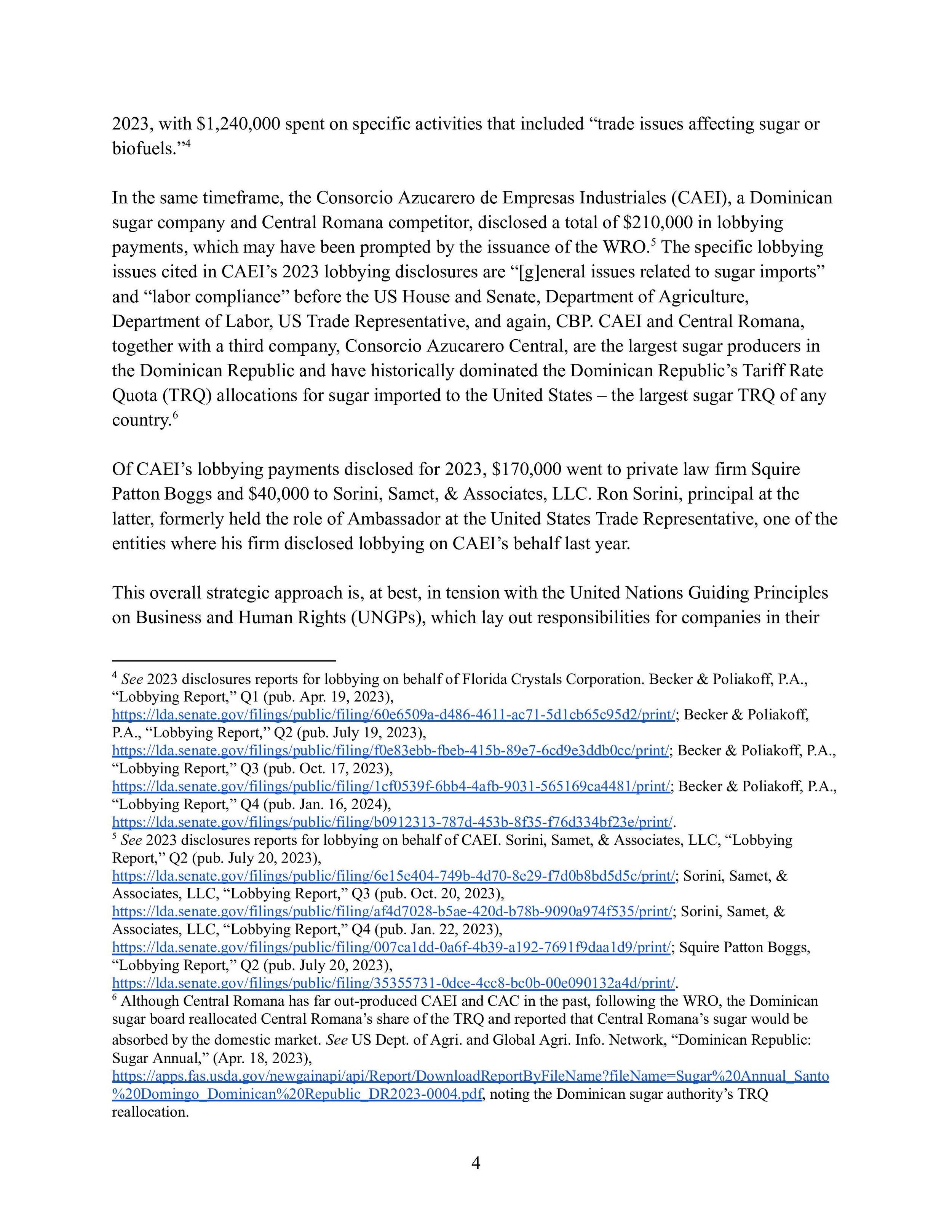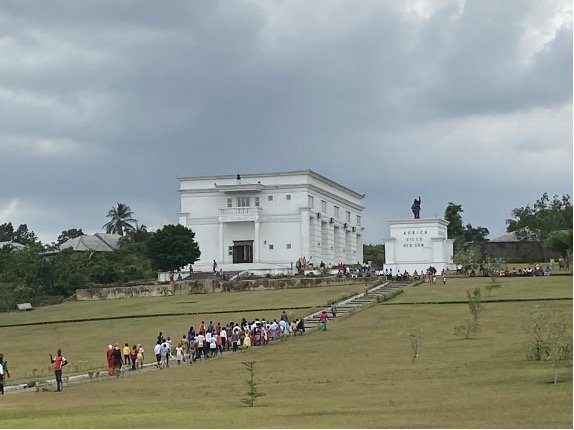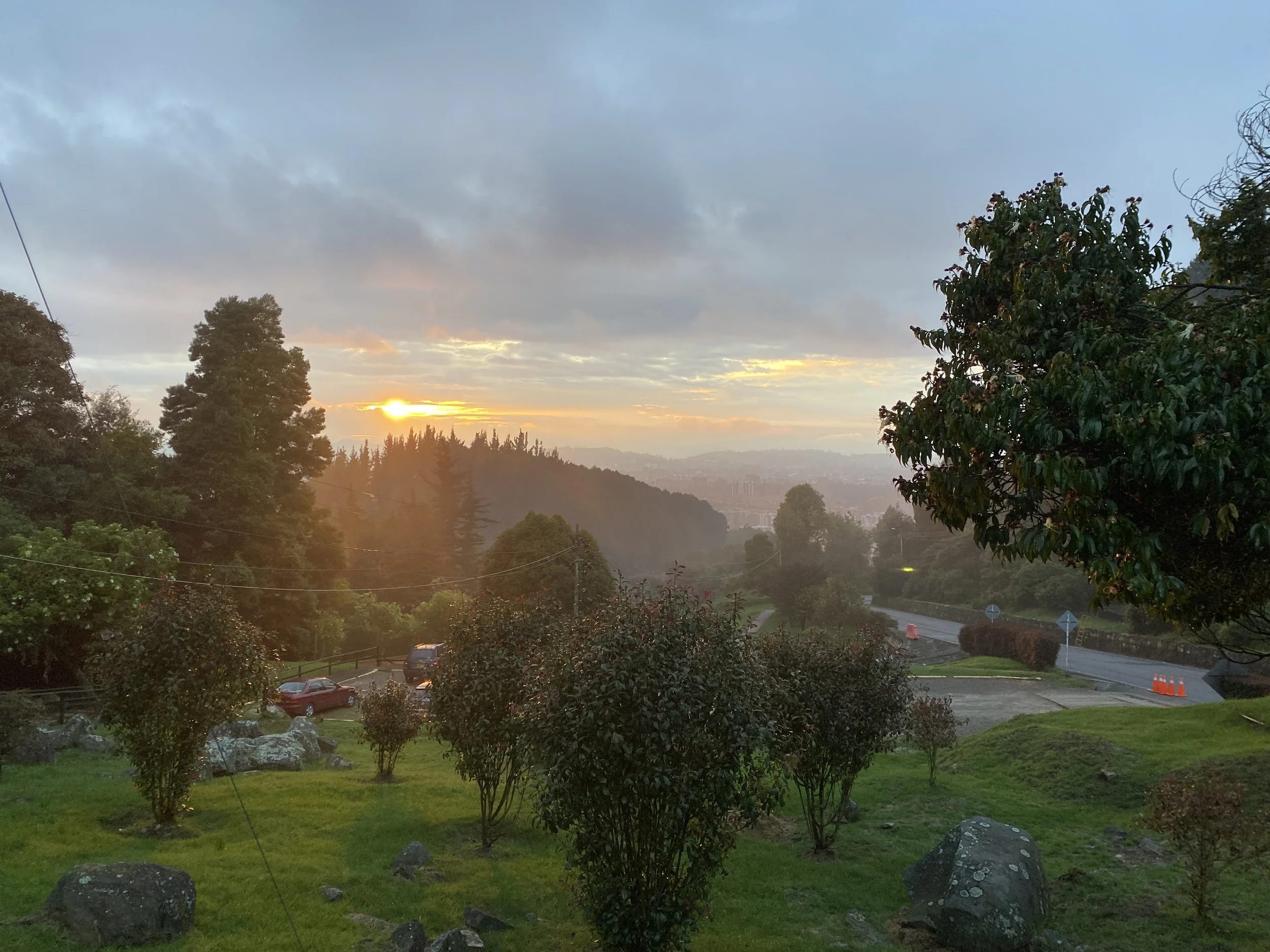The problem with the cocoa commodity price spike is not the increased price. Cocoa should be priced higher! But more of that value needs to go to the farmers who grow it. Outside of the commoditized market that supplies bulk quantities of cocoa to corporations such as Nestlé and Mondelez, alternative supply chain models already exist. Some smaller “premium” chocolate companies contract directly with farmers, paying up to $12,000 per metric ton of cocoa. They pay the premium price to ensure a supply of beans that are harvested by ethical, well-compensated laborers on an environmentally sustainable farm.
When the Law Works: In re Chiquita, State Torts, and a New Frontier
Beginning with the history of the case, this post covers the facts and implications of the recent unanimous verdict reached by a federal jury in In re Chiquita. The first part of the post details Chiquita’s history in Colombia, the human rights abuses associated with its relationship with the United Self-Defense Forces of Colombia (AUC), and the litigation that followed. The second part of the post considers the immediate future of this case as well as its systemic implications with a particular focus on this verdict’s implications for the use of state tort law in human rights litigation.
CAL se une a 35 organizaciones que firman una carta a CBP, destacando el fracaso de Central Romana para remediar el trabajo forzoso
CAL Joins 35 Organizations signing open letter to CBP highlighting Central Romana’s failure to remediate forced labor
Thirty Years Later: The Resilience of the Ogoni
Thirty years ago, the Ogoni people of the Niger Delta in Nigeria drove the multinational oil company Royal Dutch Shell (Shell) out of their territory. This nonviolent movement, led by the Movement for the Survival of the Ogoni People (MOSOP), was extraordinarily powerful. Yet, as CAL staff members saw on a visit to Ogoni in early March 2023, the struggle is far from over. The harm the oil industry wrought on this community in the 1990s runs the gamut from environmental devastation, to political oppression, to rape and murder. The dilapidated oil infrastructure in Ogoni appears to still be leaking oil into the environment, children and adults still suffer health impacts, and the fish (traditionally a major source of protein for the Ogoni population) remain scarce. But the joy and spirit of resistance is also still alive.
So-called Sustainability programs are failing cocoa farmers and their families: How Nestlé and Mondelez greenwash – and labor wash – their chocolate products
The West African cocoa industry, where two-thirds of the world’s cocoa is grown, is notorious for its human rights abuses. From hazardous child labor to child trafficking to the poverty wages that farmers earn, little of the cocoa supply chain in West Africa is “fair” or “sustainable.” Yet over the past decade, certification schemes – such as Rainforest Alliance, Fairtrade International, and Fairtrade USA – and so-called sustainability programs – like Mondelez’s Cocoa Life, Nestlé’s Cocoa Plan, Mars’ Cocoa for Generations, and Hershey’s Cocoa For Good – have proliferated.
CAL Provides New Information to CBP on Child Trafficking and Forced Child Labor in the Cocoa Sector
On February 14, 2023, Corporate Accountability Lab (CAL) submitted information to Customs and Border Protection (CBP) under Section 307 of the Tariff Act documenting instances of forced child labor in the Ivorian cocoa industry. This petition comes exactly three years after we first provided CBP with information documenting child trafficking and forced labor on the Ivorian cocoa farms that source to chocolate brands in the United States.
Shell Agrees to Pay $15 million Euros to Nigerian Farmers and Fishermen
For decades, Shell allowed oil to leak into the Niger Delta, destroying fields, making water undrinkable, and harming local populations. Over the years, there have been numerous cases filed against Shell, related to different aspects of Shell’s destruction of the Niger Delta and associated human rights abuses. (See here, here, and here.) In December 2022, Shell settled one of these cases – for 15 million Euros – after a Dutch appeals court ordered the company to compensate victims harmed by Shell’s subsidiary, Shell Petroleum Development Company of Nigeria (SPDC). This blog post first describes the environmental and human rights abuses Shell has caused in the Niger Delta. It then explains Shell’s settlement and discusses the importance of this historic case and the settlement.
DOJ settlements and fines against Glencore and Lafarge won’t compensate victims of bribery practices and terrorist financing abroad, but it’s a start
Last month, Glencore and Lafarge, two well-known multinationals, made international headlines after their guilty pleas for criminal conduct abroad led to multimillion dollar settlements and gave rise to civil claims. This post discusses the Glencore and Lafarge cases and their recent guilty pleas for bribery and for financing foreign terrorist organizations, respectively. These cases are discussed through the lens of the DOJ’s new strategy to prosecute corporate misconduct. This blog considers how these cases could be a starting point for corporate accountability and access to remedy, rather than as the gold standard.
Ending Slavery in Some State Prisons is Not Good Enough. We Must #EndtheException for All.
Yesterday’s election results gave momentum to a national movement to #endtheexception (led by the Abolish Slavery National Network). We urge everyone, as you wait for the balance of power in Congress to be decided, to contact your representatives and demand they pass House Joint Resolution 53 and Senate Joint Resolution 21, identical proposals to amend the US Constitution “to prohibit the use of slavery and involuntary servitude as a punishment for a crime.”
CAL APORTA MÁS PRUEBAS SOBRE LA COMPLICIDAD DE EMPRESAS EN EL CONFLICTO ARMADO COLOMBIANO A LA JEP
El mes pasado, Corporate Accountability Lab presentó un informe a la Jurisdicción Especial para la Paz de Colombia ("JEP"). El informe examina el papel que tuvieron las multinacionales bananeras en el conflicto armado colombiano y traslada información y evidencia asociada con litigios en tribunales estadounidenses. Esta información evidencia presuntos acuerdos de financiación que beneficiaron a empresas y grupos armados ilegales, los cuales cometieron crímenes y violaciones a los derechos humanos. Este blog proporciona información sobre el presunto papel de Chiquita y Dole en el conflicto armado por medio de su financiación a grupos paramilitares. Este blog también amplía la presentación anterior de CAL sobre el papel que Drummond y Prodeco tuvieron en el conflicto, abordando y proporcionando recomendaciones sobre temas como la violencia antisindical, una transición justa y alternativa a combustibles fósiles, y una justicia restaurativa.
CAL PROVIDES MORE EVIDENCE OF CORPORATE COMPLICITY IN ARMED CONFLICT TO COLOMBIAN PEACE TRIBUNAL
Last month, Corporate Accountability Lab submitted a report to Colombia’s Special Jurisdiction for Peace (“JEP” for its Spanish acronym). The report analyzes the role that multinational banana companies played in the Colombian armed conflict and provides evidence obtained by U.S. courts of financing arrangements benefiting these companies and illegal armed groups that committed widespread human rights abuses. This post provides information regarding Chiquita and Dole’s alleged role in the armed conflict and expands on CAL’s earlier submission by addressing and providing recommendations on the issues of anti-union violence, a just transition away from fossil fuels, and restorative justice.
CAL Welcomes Seven New Board Members
CAL is extremely proud to welcome seven wonderful new board members to our team! Zamira Djabarova, Raphael Hoetmer, Kish Parella, Kaitlin Cordes, Jillian Tuck, Erin Essenmacher, and Elisabeth Mabus each bring unique skills, qualifications, and energy to our board. At an in-person retreat earlier in October with our four returning board members, Ed Vogel, Laura Vilim, Lupita Aguila Arteaga, and Jenna McElroy, we saw firsthand how well the group works together. We’re certain big things are to come, and we’re thankful to have the guidance of this special group of people. Read on to get to know them a bit more.
The 2022 CLASP Lab Convening in Bogotá: a Scrapbook
From June 26th to June 28th, 2022, CAL and our partners at the African Coalition for Corporate Accountability, Dejusticia, and the Comisión Intereclesial de Justicia y Paz held an in-person gathering of the Corporate Liability and Sustainable Peace (CLASP) Lab, a collection of nearly 40 leaders and advocates from 25 countries, in Bogotá, Colombia. The convening was the culmination of a year-long virtual “social lab” process in which we led the group through an adaptation of our legal design process around the question of corporate impunity for human rights and environmental abuses committed during conflict–and how to break with that impunity.
FIFTY YEARS OF CORPORATE EXPLOITATION: ENVIRONMENTAL, LABOR, & HUMAN RIGHTS ABUSES BY US MINING GIANT FREEPORT (PART II)
In our first post of this three-part series, we outlined Papua’s violent colonial history, the ongoing Free West Papua movement, and the inextricable connection between this history, present-day struggles, and Freeport’s operations in the region. In this post, we’ll dive into the specific harm experienced by mine workers, surrounding Indigenous communities, and the unique Papuan ecosystem– and, we’ll describe Freeport’s alleged role in all of it. For over fifty years, Papuans have suffered for the sake of a foreign company’s profits. Freeport’s initial investment, made in the throes of colonialism, is a critical part of this story, and the company’s dominance over Papua’s economy and institutions continues today, making accountability very difficult to achieve.
21 años de impunidad empresarial y la resistencia del sindicato colombiano Sintramienergética
El mes pasado, la Comisión Colombiana de Juristas (CCJ) en alianza con PAX Colombia y el Sindicato Nacional de Trabajadores de la Industria Minera, Petroquímica, Agrocombustibles y Energética (Sintramienergética) presentó el informe titulado “La explotación minera de Drummond Ltda.: epicentro de persecución, asesinatos y violaciones de libertades sindicales” a la Jurisdicción Especial para la Paz (JEP). El informe se centra en la violencia sufrida por el sindicato Sintramienergética, incluyendo el exterminio de sus líderes sindicales en el 2001. Este blog es una actualización del blog de abril de 2021. Esta entrada proporciona información adicional sobre los asesinatos de los líderes sindicales, a la vez que describe su trabajo, el contexto en el que fueron asesinados y la lucha actual contra la impunidad por sus muertes.
CAL provee evidencia de la complicidad empresarial en el conflicto armado a la Jurisdicción Especial para la Paz en Colombia
Corporate Accountability Lab presentó recientemente a la Jurisdicción Especial para la Paz (JEP) la primera parte de un informe sobre el papel de las empresas multinacionales en el conflicto armado. El informe sirve para apoyar las investigaciones del tribunal de justicia transicional sobre los crímenes cometidos en regiones como el Cesar y el Magdalena Medio a través de asociaciones entre agentes del Estado, paramilitares y "terceros" ("terceros civiles" o "no combatientes"). La última de estas categorías es muy amplia y puede incluir a las empresas.
CAL Provides Evidence of Corporate Complicity in Armed Conflict to Colombian Peace Tribunal
Corporate Accountability Lab recently submitted the first half of a report about the role of multinational companies in the armed conflict to the Special Jurisdiction for Peace (JEP, for its acronym in Spanish). The report serves to support the transitional justice tribunal’s investigations into crimes committed in regions including Cesar and Magdalena Medio through associations between state agents, paramilitaries, and “terceros” (“third party civilians” or “non combatants”). The last of these categories is very broad and can include corporations. The role of all actors–not just combatants–must be reckoned with to achieve justice and sustainable peace in Colombia and beyond.
CAL joins amicus brief supporting victim-survivors of human trafficking in Thai factories serving U.S. seafood market
CAL and 18 other human rights organizations recently filed an amicus brief with the United States Ninth Circuit Court of Appeals in support of the plaintiffs in Keo Ratha, et al. v. Phattana Seafoods, Co. Ltd. et al. (Ratha). The Ratha plaintiffs, Cambodian villagers living in poverty, allege that several US and Thai companies violated US and international law by engaging in a joint venture that relied on trafficked and forced labor of plaintiffs and others to produce shrimp and seafood for export to the US market. The amicus brief, written by Global Labor Justice-International Labor Rights Forum, supports the plaintiffs’ petition for rehearing en banc of a Ninth Circuit decision that would preclude them from seeking redress against the defendants and set dangerous precedent for other victims of trafficking and forced labor seeking justice in US courts.
Corporate Accountability Lab reafirma su apoyo a la Comisión Intereclesial de Justicia y Paz y su trabajo en materia de justicia restaurativa y garantías de no repetición
Corporate Accountability Lab (CAL) reafirma su apoyo a la Comisión Intereclesial de Justicia y Paz (CIJP) y su compromiso hacia una paz sostenible en Colombia. En los últimos días, los ataques públicos contra el trabajo de la CIJP han aumentado. La CIJP está siendo falsamente acusada de ofrecer beneficios judiciales a favor de una campaña presidencial. CAL no puede permanecer en silencio ante estos ataques contra uno de nuestros aliados más cercanos en América Latina.





































